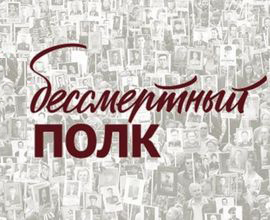About the school today is the question of which society our children will live in. Whether they will be modern people in the full sense of the word: brilliantly educated, independent, independent. Become
ABOUT SCHOOL
Today is the question of which society our children will live in. Whether they will be modern people in the full sense of the word: brilliantly educated, independent, independent. The teachers of our school help them to become so.
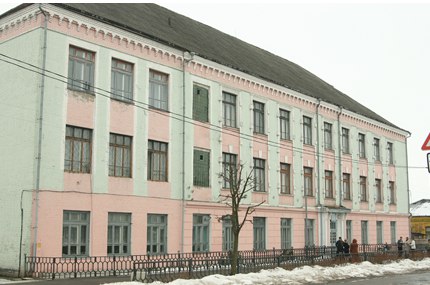
The school building is typical, with one extension. The school has 35 study rooms, a sports hall, an assembly hall, a library, a buffet, a service office, a medical office, an SPPS office, a modern computer class.
According to information that were preserved in the Belarusian State Archive in 1922 in Bobruisk existed 30 schools. There was a school at number 3 named after A.S. Pushkin. The building of this school was located on the street. Semenovskaya No. 15, now this street is called Moscow. The school building was wooden. The children of the military studied in it, who often moved from place to place, so teaching at school was conducted in Russian. This is all the information that has been preserved about the school under No. 3 in the 20-30s. XX century.
In 1939 On the street. Sovetskaya grew a new, three -story building – it was a secondary school No. 3 named after A.S. Pushkin. It was designed for 400 students. From the first years, the school worked in one shift, and studied in it 10 classes-comprehensive. The director was Lioro Anatoly Kuzmich.
In 1940, the first release of students of secondary school No. 3. The release of 1940 was very talented in the new building. All the guys entered universities. But all dreams and hopes were destroyed by one stroke.
You can’t say better than these words:
… the war has gone. Sent to museums
In battle, the caught trophies,
And as a story page
The rifle is kept there.
This is about them, graduates of our school: Lieutenant Colonel Lensky G.A., Shakuro V.A., Lebedev I.V., Levina G.A., Kogan L.A., together with the students passed the roads of war and teacher: Vdovin N. N.N., Nikiforov I.N., Urbanovich A.P., Demidova L.K., Chernushin G.B., Pushkareva E.I. Like many others, teachers, graduates and students of school No. 3 went to the front in 1941.
1941 He has become a tragic year for the entire Belarusian people. The beginning of the war laid the beginning of the occupation regime of fascist Germany. The city of Bobruisk was captured by the Nazis. Fascist invaders in different ways destroyed people. In the school building during the war, the Nazis launched a hospital in which there was a children's receiver – a donor concentration camp. On the second floor there was a special office, which was used as a donor. The Nazis chose 12-14 year old children with donors. The dead children were buried in the yard of the school.
Donor children were well fed, looked after and once a month took blood from each child, the amount of which corresponded to the age and fattening of a drunker-donor.
In one of the numbers of “Nakanitskay newspapers”, an article was published for 2000, which spoke about the terrible belly of the history of school No. 3.
From the memoirs of Mikhail Aleksandrovich Kushnerov, a resident of Mogilev, retired police lieutenant colonel, a former prisoner of the gambling system.
His family before and on time of the war lived in the village of Ala in the Kirovsky district, in the Mogilev region. Michael’s father went to the front, and his mother stayed with the children: 13 years old Misha and two younger daughters.
At the very beginning of March 1944, early in the morning their village was surrounded by German soldiers and ordered all the inhabitants to gather at the end of the village. For disobedience – execution. People gathered. They approached the car covered with tarpaulin. The Germans drove people into cars and took the guard towards the railway. Cars came close to the wagons, and the Germans overtook people into cold wagons. The crying of children, the cry of women were heard from each car. For a day they drove tired people.
The train stopped. This, as Misha later found out, was Bobruisk. Cars drove up. The guards overtook the boys into the body of the car. About ten children of slaves remained without movement in the car – they died from hunger and cold.
The children were brought to the premises of school No. 3, drove into empty classrooms. The guards were pulled by the very weak hands. Misha was dragged upstairs (now it is an office No. 11), threw on the floor. Here, in addition to the guards, there were women who helped children build.
The worst began. Two guards and German in a white coat are approaching the boy-a fool. The guards hold the child, and the fascist approaches the victim with a large syringe, inserts the needle of the syringe into Vienna and sucks all the blood to the last drop. The child becomes white in his face and, white, exhausted to go to the floor, freezes, and only the blue lips are trying to say: Ma-ma. After 5-6 hours, the boy dies. The guards take out the corpse of the child from the classroom and thrown into a yam-mogil dug in the yard.
On June 29, 1944, the city was exempted from Nazi invaders. He was all in ruins and ashes, but the school building survived. On October 1, 1944, the school began work. It was difficult for both students and teachers. There was no furniture – they made tables from the boards, the heating system did not work – stoves were put in the classes, dugouts and bunkers were dismantled. They worked in three shifts, wrote on newspapers, in inkwalls froze ink, but as they wanted to teach and study.
Everything has its beginning. Life begins from birth, the book – from the prologue, the theater – from the hanger, and the school? The school, according to many, begins with the director. At different times, they were: Inusov P.V., Akulich S.K., Kuznetsov G.K., Petrashkevich, Friedman A.A., Glushakov N.I., Mikholap L.M., Aydarova G.P. ( Smolina), Orlova T.P., Dubskaya E.A., Martinovich T.N., since August 2018, the director of the school has been FISYUK Alexander Ivanovich.
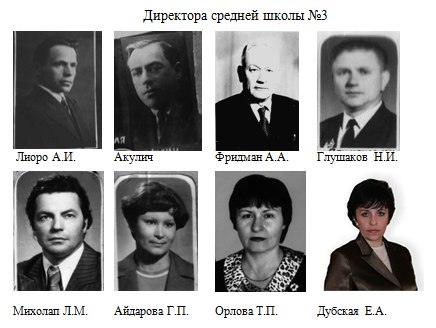
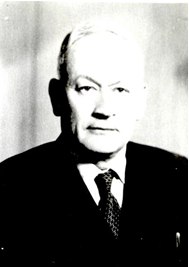
For many years the permanent director was Friedman Alexander Aronovich , since 1944, immediately after the liberation of Bobruisk, and until the end of 1973.
Friedman A.A. – An experienced, smart, capable leader, sensitive, kind person, good teacher, mentor.He loved his school, students, teachers very much. He managed to educate a team of dedicated teachers who, like him, gave all their strength, knowledge, all their lives to the school. There were no weak teachers in the school, everyone strived to ensure that there were no bad students. For many years the school held the championship. Studying at school number 3 was prestigious. Alexander Aronovich knew every student, his parents, he had an approach to every person. Every teacher and student knew that one could turn to him in difficult times, get practical advice, help, and moral support. Alexander Aronovich worked as a director for almost 30 years. He was retired for six months and could not live without school, he died just on the eve of the first exam – on May 31, on the night of June 1, 1974.
An addition was added to the school in 1960. It housed an elementary school, a sports hall, labor training classrooms, and a canteen.
In 1966, the Bobruisk Autotechnical College rented the premises of secondary school No. 3 for classes.
In 1971, secondary school No. 3 was one of the first in the city to open a class with the study of auto business.
The fate and creative path of the teacher of our school, Evgenia Ivanovna Pushkareva, causes pride. In 1939, a young, pretty girl, a teacher of drawing and painting, Evgenia Ivanovna, crossed the threshold of the school. War … and together with the students she went to the front. From Stalingrad to Prague, a fighter, and then lieutenant Pushkareva, passed along fiery roads and fields of fierce battles. After the victory, she returned to her former profession of a teacher. In September 1946 she returned to school. 47 years of conscientious work. For her work she was awarded the title of Honored Teacher of the BSSR.
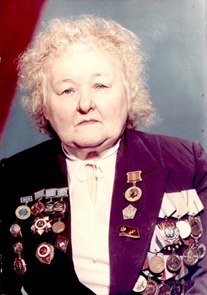
Physics teacher Georgy Savelyevich Openchuk also left a bright mark on the history of this school. In the education system since 1940. Front-line soldier, has military awards. He worked as a teacher until the age of 89. He worked at our school from 1951 to 1975. These were the years of glory of school No. 3 in organizing the technical creativity of students. Exhibits made by students under the guidance of Georgy Savelievich Openchuk, a physics teacher, were shown at VDNKh and won gold and silver medals. In 1961, Georgy Savelievich was awarded the title of Honored Teacher of the BSSR and the Order of Lenin.
In 1940, Georgy Savelyevich graduated from the Leningrad State Pedagogical Institute. Having received a red diploma, he planned to do science, to study further. He was offered to stay at the Department of Physics. All the prerequisites for carrying out the plan were evident. Among the teachers was a nuclear physicist Professor Igor Vasilyevich Kurchatov. Georgy took an exam in electronic physics for him. But it was not possible to stay at the department. The Finnish war has begun. Many teachers from the Leningrad and Pskov regions were mobilized to the front. As a replacement, young graduates were sent to schools, among whom was Openchuk G.S. A year later, the physics teacher himself defended Leningrad. During the war, Georgy Savelyevich was a radio operator.In 1943 he was seriously wounded. For almost six months he was treated in the hospital and then returned to the front again. For combat merits, he was awarded the Order of the Patriotic War of the 2nd degree, a medal to them. Marshal Zhukov and the medal For the victory over Germany.
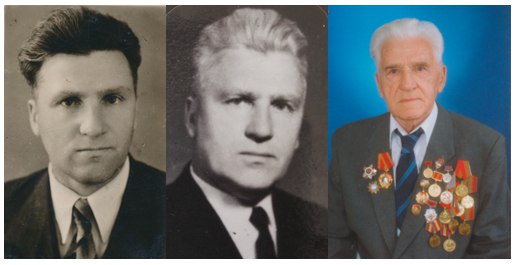
Years are coming. The school is proud of its graduates.
Among them is the corresponding member of the Academy of Sciences of the BSSR Kuzmichev G.P., Doctor of Sciences: Gorelik I.I., Savrukhin A.D., Goman N.N., Onegin E.E., candidates of sciences: Egorov I.A., Beloborodov S.E., Khokhlov N.A., Nikiforova V.N., Shapiro Yu.O. And others, total – 64 graduates. Laureates of state awards: Kuzmichev G.P. and Afanasyev M.N., poet Jan Mayzels, writer Boris Shapiro, Leonid Rubinstein, chairman of the Council of Public Association “Bobruisk City Jewish Community” (2007).
School graduates replenished the country's education and healthcare: Bernyak Petr Ivanovich – Honored Doctor of the BSSR, awarded the Order of the Honor; Methodist teacher Maron V.E., Honored Teacher of the BSSR-Pushkareva Evgenia Ivanovna.
The directors of large enterprises were: Onegin E.E. – General Director of NGO Planar, Khrushchinsky I.V. – Director of the mirror factory.
The right V.D. – Graduate of the Academy. Frunze, awarded two orders of the Red Banner, the Order of the Red Star, was three times in Afghanistan.
Shapiro Yuli Osipovich graduated from secondary school No. 3 of Bobruisk in 1955, in 1964 – the Vitebsk Veterinary Institute, the Zootechnical Department. He graduated from graduate school in 1969 at the Department of Genetics and Drive of Agricultural Animals under the leadership of O.A. Ivanova. In 1969, the degree of candidate of biological sciences, the title of associate professor in 1981 was awarded.
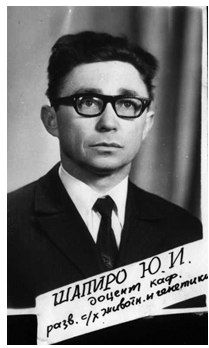
Memories of graduates
From the memoirs of Leonid Rubinstein, Chairman of the Council of the Public Association Bobruisk City Jewish Community.
Was born: In 1939 in Bobruisk.
Finished: Secondary School No. 3 of Bobruisk, Novosibirsk Electrotechnical Institute.
Have worked: In the defense industry of the USSR, since 1966 in Bobruisk on the construction of the Belarusian tire plant. Here for more than 15 years he held various leadership positions – deputy, acting The main energy of the KSSH plant, the main energy of the Belshina association. In 1979 he moved to a mechanical and technological college, where he worked until 2000. He retired and was then elected chairman of the Jewish community of Bobruisk, which he still heads.
Achievements: Honored inventor of the USSR, excellent student of secondary education of the USSR, laureate of the Prize of the Council of Ministers of the USSR, was awarded the Order of the Badge of Honor, medals of VDNH, For Military Valor, For Labor Distinction. He wrote 7 books – poems, stories about people, now he is preparing a book of his own aphorisms for the publication.
Family: The wife, Kromskaya, Galina Maksimovna, until a well -deserved rest, worked for many years the head of the FTO in the Bobruisk installation department of the Promtekhmontazh trust. Together with his wife, a daughter was raised. There are three grandchildren and great -grandchildren.
“Makuha was the biggest delicacy”
– Leonid Aronovich, you were born and raised in Bobruisk, tell us how your family survived the difficult war years?
– I was born in Bobruisk on the eve of the war, and my whole life is connected with this city, from the street. Oktyabrskaya, where I lived almost all my life and live now … When the war began (I was three years old then), my mother and I were in the village of Svisloch, Osipovichi District, with my father's parents. Soon her grandfather saw the German landing and said: Nyura, take the children and leave. Mom took me, my older sister, cousin and headed towards the station. They are carried in order to get to the rear from there. The last part of the civilian population was not taken. But the soldiers probably took pity on my mother: a young woman (she was only 31 years old with three children) … We got to Smolensk, then from there we got to a transit point in Tambov and, in the end, ended up in distant Bashkiria. The collective farm we ended up on was large and prosperous. But then all the men were taken to the front, and it became very difficult. There is nothing. Bread was baked from quinoa. My sister fell ill from this famine and died after the war. The biggest delicacy was makuha, which is fed to cattle in peacetime, it seemed to be a delicacy. Later, when I was in the countryside in the post-war period, I asked to be allowed to try makukha. To which I heard the answer: You will not eat it. Nevertheless, he persuaded, treated, and her taste really turned out to be not the one that remained in the memory from childhood … Until 1943, we knew nothing about the fate of my father. He had very poor eyesight, he was not fit for the army. During the evacuation, he was engaged in the procurement of livestock for the front. In 1943 he came to us. After the liberation of Belarus, he, as a communist, was called back to Bobruisk, and, as before the war, he again began working as the director of the House of Pioneers. It was hard, hungry. It's good that at school they gave 100 g of bread each … The war hit many hard. Almost all of my mother's family perished in various ghettos, with the exception of her brother and sister. Later, in 1953, my sister died – her health was affected by the wartime famine.
Well, I gave more than 15 years to the tire plant, one might say, built it, for my work here I received several government awards. In 1961 he married Galina Maksimovna, and for 46 years now we have been living with her in love and harmony. This is my first and only love in my life. And I am very grateful to her for her support and understanding. We have a wonderful daughter who, like her mother, graduated from high school with a gold medal, then from a construction institute, and then from the faculty of economics. We have three grandchildren and a great granddaughter.
“Jews in Bobruisk are 50 percent. The rest are Jewish
— How many Jews are in Bobruisk now?
– According to our data, about four thousand people. It is difficult to give an exact number.
– And how many Jews were there before?
— There was a time in the history of the city when the Jewish population was 60 or even 80 percent, when the language of interethnic communication was Yiddish. There was even such an anecdote.When the Bobruitsy was asked how many Jews were in Bobruisk, they answered: 50 percent. And the rest? – The rest of the Jews …
– Is your community the only Jewish organization in the city?
– Not. There are three more religious ones: Jewish, ultra -orthodox, with the religious direction of the Khabad, it belongs to the synagogue on the street. Socialist, 36; The Base Israel community (also orthodox) and the community of progressive Judaism. In addition to the above, there is also a charitable organization of the HESED, which helps people of retirement age. But representatives of all these Jewish organizations of the city are part of our community. The Bobruisk Jewish community is one of the oldest in the republic, in April next year it turns 500 years old! She was always strong and largely thanks to her in the city there was always friendship between Jews, Belarusians, Russians and people of other nationalities. Moreover, if in other cities of Belarus there were Jewish pogroms, then in Bobruisk – never.
– What is the Jewish community doing today?
– The main activity is charitable. We provide assistance to Jewish families, their children, pensioners, the righteous of the world, who saved Jews during the war years, children's institutions of the city, for example, an orphanage, a boarding school, a special school in a storage room, a child’s house. The community operates several Sunday schools, there are circles, we have a wonderful amateur performances. “Community” teachers are engaged not only with children, but often with parents, and not only with Jews – we accept everyone! We also did a lot of work on the census and accounting of graves in the Jewish cemetery, published a special book of memory, and today everyone who appeals to us to find the graves of loved ones receive the necessary certificate of burial for 10 minutes.
– Do you think Bobruisk lost its face with the emigration of the vast majority of the Jewish population?
-Naturally, I lost something. Indeed, among those who left abroad there were many class specialists – doctors, teachers, engineers. Many in the city still remember the doctors of Raeva (husband and wife), Hayman, Belenky, Marona, Barchi, Benenson and others. Of course, other professionals replaced them, but something went irrevocably.
Bobruisk roots have eight Nobel laureates – Bobruisk, and in particular its Jewish part, was always rich in talents, especially the writing direction. Recall Sevel, Koval …
-… Sola Schulman, Mikhail Gerchik, our fellow countryman Kazimirovsky lives in Stockholm, in the past-the actor of the Bobruisk theater, who became a writer, in Los Angeles-Piny Plotkin, who is already 94 years old. Constantly to his hometown, artist and writer Abram Rabkin come from St. Petersburg. Not so long ago, the nephew of the famous writer Tunkel came.
– And all of them, one way or another, recall their native Bobruisk in their works. Strong, therefore, roots?
– Yes, they all wrote and write about Bobruisk, about his streets, people. A few years ago, together with Arkady Schulman, we published the book “The Non-Gasy Light”, which contains excerpts of the works of 23 world-famous Bobruitsy writers. But not only our land is rich in writers. There is evidence that Bobruisk roots have eight Nobel Prize laureates. I hope that many prominent foreign guests, one way or another associated with Bobruisk, will come to our city for the celebration of the 500th anniversary of the Jewish community.
-And such a well-known businessman as the president of Detroit-Bryarus Brewing Company (owner of our brewery, and now the Syabar brewery) Eugene Kasper, do you think to invite? After all, he, they say, also have a great -grandfather from Bobruisk.
– We have long wanted to meet him, but so far everything does not work out. Will hope! By the way, people who were not born in Bobruisk come to us, but have Bobruisk roots. And they consider Bobruisk their homeland. For example, the famous writer Hai Or was born in Israel. But in Bobruisk lived its ancestors. And at the first opportunity, she tries to come to our city, asking with interest about its history.
– Rumors reach us that some Jews who left abroad today would like to go back. Returning?
– Some yes. But this is quite difficult. After all, many left because children wanted or, conversely, parents. And now not everyone will decide to leave the children and return.
– And you, Leonid Aronovich, never had the desire to leave?
– Not. Maybe because such a desire did not arise in the family of a daughter. And because the homeland is here. Where you were born, you grew up, where your loved ones lived, friends. Leaving, you won’t take your homeland with you. The man left, and here the graves of relatives remained, the memory of childhood, friends, memories of first love. It is impossible to cross out from memory. The task of our community is to do everything so that the visitors feel that they came home. We succeed, because Bobruisk is prettier, it becomes more beautiful every year. And to everyone who comes, it is pleasant to see his homeland transformed.
Our questionnaire
What is your zodiac sign?
Your favorite book?
– I like to read poetry, recently also aphorisms.
Your favorite season?
– Summer and especially spring.
Favorite holiday?
– Family, birthdays when relatives and friends gather.
Favorite animal?
– Cat. We have been living for a long time by the cat Mulya. The smartest creature with which we rest.
What songs do you like to hum?
– Songs of my youth.
Your ideal woman?
– It is important for me that a woman understands and respects me.
Your favorite dish?
– Pilaf. My wife cooks him perfectly.
What do you like to drink?
– I practically do not drink alcohol. And from soft drinks I give preference to coffee.
– Your favorite corner on Earth?
– I love Belarus, Bobruisk. And before Chernobyl, he generally believed that there was no better place for life on Earth.In our city I like to walk around the sanatorium, the new bridge, I often take pictures of these places.
From the memoirs of a 1960 graduate Nina Ivanovna Lobatnaya.
Born in the city of Bobruisk, graduated from the 7th grade of the seven-year school No. 20. In 1957 she entered the 8th grade of secondary school No. 3. In 1960 she graduated from 10 classes. Studied in an old building without an extension. The entrance to the school was from the courtyard. Toilets were outside. There was no wardrobe in the foyer of the school; hangers were located right in the classrooms. The classrooms had tables and benches designed for 2 people. There were 30 students in the classes. After school, she entered and graduated from the Pinsk Accounting and Credit College. According to the distribution, she was sent to work in Klimovichi as a bank manager, where she worked for 25 years. Graduated from the Higher Party School. Has 2 children and grandchildren. With warmth and gratitude, he remembers his teachers, class teacher Artyushevskaya, history teacher Galimskaya, excursions on the boat along the Berezina River from classes, New Year's evenings.
From the memoirs of Sorina Khana Elkovna, born in 1933. Since 1990 lives in Israel, Jerusalem.
During the Great Patriotic War, she was evacuated with her mother. In 1944, they returned to Bobruisk and entered the 4th grade of secondary school No. 3. The years were difficult, after the war, and her first teacher, Maria Alexandrovna, remained forever in her memory. In 1948 she finished 8 classes and entered the Bobruisk Motor Transport College. Be proud that I studied at secondary school No. 3, where the children of party workers, military personnel studied, where the best teachers in the city worked, strict, but cordial and sincere.
A school is not a building, not classrooms…
School is an exalted spirit, a dream, an idea,
that captivate three at once –
teacher, child, parent
and are immediately implemented.
If they are not, then this is not a school …
A.A. Zakharenko.
It has become a tradition of the school to hold an evening of meetings of graduates of different years. From year to year, our school releases its students into a great life. But there is a special graduation in our school, which also does not forget the native teachers, the school.
The 13th graduation of the 10th grade of secondary school No. 3 in 1959 is the most friendly. In May 2009, they celebrated the anniversary of their release – 50 years.
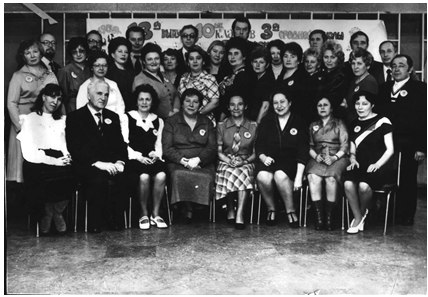
Meeting after 25 years
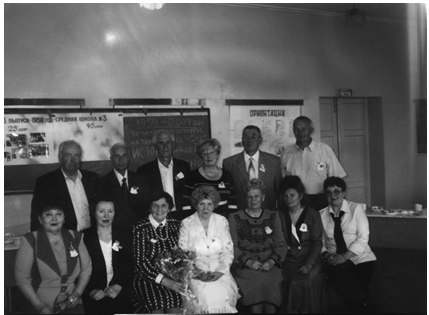
Meeting after 45 years
The school remains the main and, perhaps, the only center of education today. After all, the life success of a person determines not only the IQ, but also the level of upbringing. To support and raise it in children is the main task of the entire teaching staff of secondary school No. 3.



